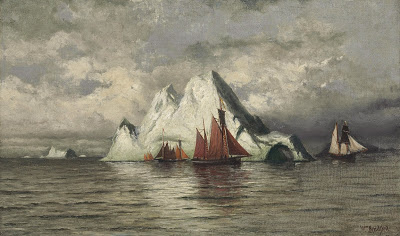You’ve probably heard the old writing adage “kill your darlings.” What this means, essentially, is that you shouldn’t be so attached to something in your novel, whether it’s a passage of beautiful prose or a whole plotline, that you wouldn’t kill it if it would be an improvement.
And it’s right. It’s so important to do whatever it takes to make your novel better, and even more importantly, to avoid stuffing your novel with every good idea you’ve ever had or beautiful sentence you’ve written.
But there’s more to leaving things out of your novel than that.
You shouldn’t even plan to include all the ideas you have in your drafts. As I alluded to in last week’s post on fleshing out characters, there is a ton you should know about your characters and setting that probably won’t ever make it into the novel. You should be thinking of some of these ideas with no plans whatsoever to include them unless you really need to.
As the painting atop this post alludes, a novel should be a tip of the iceberg above a much larger base. That base is everything you know about your characters’ back stories, the history of your setting and your characters’ forefathers, the technology, the government, etc. etc. etc. Chances are only a fraction of this knowledge will ever come into play, because the key to exposition is to only tell the reader what they actually need to know to understand the events of the novel. (I talk much more about exposition in How to Write a Novel).
George R.R. Martin is both an exemplar of this rule and a bit of a cautionary tale. Reading the Song of Ice and Fire novels (better known as Game of Thrones), you have an incredible sense of a rich thousand-plus year history of a land where Martin seems to know every speck of dirt. You really have the sense that Martin could, given enough time, write the entire history with as much detail as he has written in the five novels and that he has already invented it all. On the other hand, sometimes it can be confusing and interminable in those novels when this knowledge creeps in arbitrarily.
Know the history of your settings and characters. Use the knowledge well. Just don’t use it all.
Art: Fishing Boats and Icebergs by William Bradford




This is exactly what I was working on last week – going through an overstuffed early draft and slicing out a lot of things that are just not important enough (to anyone besides me) to move the story along. Sometimes it's brutal, for sure. But it absolutely makes the work stronger.
I just started reading the series, and marveled about the rich history, perfectly built. Lots of gossipy details that leave me wanting to read more about the mentioned characters, but not during this novel. This is hard to do in any genre.
I started reading the first novel of the series "a Game of Thrones". Everything is so detailed and well'thought. Martin seems genius to me. It's like HE IS THE NOVEL…
Martin has way too many irons in the fire. I wish he would just set his sights on finishing Winds of Winter instead of working on all these other projects. It’s not right to string devoted fans along for so many years. 🙁
If there was any profession or role in life where it's absolutely okay to be a hoarder, it's as a writer. You may amend or remove material from your story but you never throw it out.